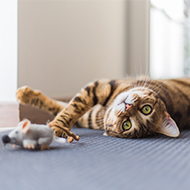Meaty food and play could reduce hunting in domestic cats, study suggests

"By playing with cats and changing their diets, owners can reduce their impact on wildlife withou restricting their freedom" - Professor Robbie McDonald.
Daily play and a rich-meat diet could reduce hunting behaviour in domestic cats, according to new research.
The impact of domestic cats on wildlife is of growing international concern. However, methods to reduce hunting behaviour are controversial and are often reliant on restricting behaviour in ways that some cat owners find unacceptable.
In this study, researchers at the University of Exeter worked with 219 cat-owning households to trial various welfare-friendly interventions that reduce feline hunting behaviour.
They found that owners that fed their cats a high meat protein food, and owners who played with their cats for a few minutes each day, reduced the number of prey animals their felines brought home by 36 per cent and 25 per cent, respectively.
Study author professor Robbie McDonald, from Exeter's Environment and Sustainability Institute, said: "Previous research in this area has focussed on inhibiting cats' ability to hunt, either by keeping them indoors or fitting them with collars, devices and deterrents.
"While keeping cats indoors is the only sure-fire way to prevent hunting, some owners are worried about the welfare implications of restricting their cat’s outdoor access. Our study shows that – using entirely non-invasive, non-restrictive methods – owners can change what the cats themselves want to do.”
He added: “By playing with cats and changing their diets, owners can reduce their impact on wildlife without restricting their freedom."
In the study, owners used a feather wand to play with their cat and simulate hunting prey. After each hunt, the owners gave their cats a toy mouse to play with to mimic a real kill. Researchers say it is not clear what elements of the meaty food led to the decrease in hunting.
Martina Cecchetti, the PhD student who conducted the experiments, said: "Some cat foods contain protein from plant sources such as soy, and it is possible that despite forming a 'complete diet' these foods leave some cats deficient in one or more micronutrients –prompting them to hunt.
"However, meat production raises clear climate and environmental issues, so one of our next steps is to find out whether specific micronutrients could be added to cat foods to reduce hunting.”
The study, published in the journal Current Biology, also examined the effect of existing devices to limit hunting behaviour.
It revealed that fitting cats with brightly coloured collars reduced the numbers of birds captured and brought home by 42 per cent but had no discernible effect on mammals. Cat bells were found to have no discernible effect.



 The latest
The latest